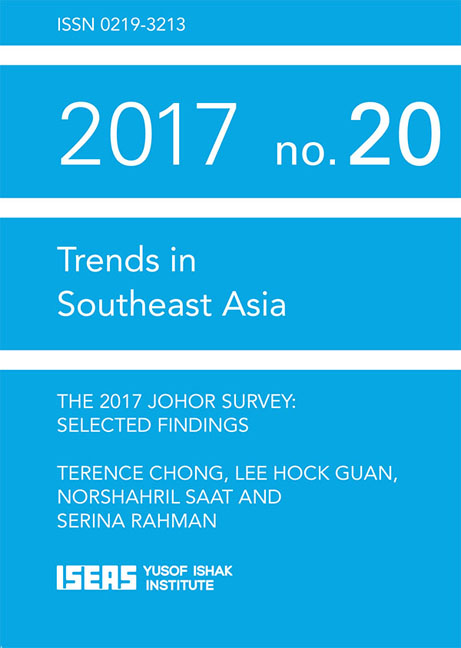The 2017 Johor Survey: Selected Findings
Published online by Cambridge University Press: 12 March 2019
Summary
Introduction
Johor, more than any other Malaysian state, and Singapore enjoy a unique familiarity that has been nurtured by geographical proximity and historic ties. Thousands of Johor residents, many of whom are Malaysians from other parts of the country, make the daily trip across the Causeway to work or study in the island republic.
There were approximately 1.3 million foreign workers in Singapore as of June 2017. It has been estimated that between 450,000 and 500,000 Malaysians are working in various sectors in Singapore, including the approximately 120,000 Malaysian workers who commute daily from Johor. The two-way traffic averages 400,000 daily, even reaching 430,000 during festive periods, making the Singapore–Johor border one of the busiest in the world.
The strong Singapore dollar also encourages thousands of Singaporeans to travel to Johor for shopping and food, thus providing a boost to the local economy. There are about 5,000 Singaporean families who have set up home in Johor. These are either retirees who prefer a slower pace of life or adults working in Singapore who have made the trade-off between affordable landed property and the daily cross-border commutes. Cheaper houses, cars, petrol and favourable terms under the Malaysia My Second Home Programme have also made Johor more attractive to foreigners.
Johor's economy has been predicted to do well in the near future. With a GDP of RM104.4 billion, Johor is expected to become Malaysia's second largest state economy in a few years, relegating Sarawak, which has a GDP of RM108.7 billion, to third place. Selangor, with a GDP of RM251.5 billion occupies the top slot. Since 2011, Johor's economy has grown at a faster rate than Malaysia's as a whole, except for 2013 when their rates mirrored each other. In 2016, Johor's 5.7 per cent growth rate was higher than those of Malaysia's other twelve states.8 Much of Johor's growth is due to cheaper properties and goods compared to Singapore, as well as the Iskandar Malaysia development project that is expected to cover 2,200 sq. km when completed in 2025. One of the spillover effects of Iskandar Malaysia is the construction sector's strong growth of 24 per cent in 2016.
- Type
- Chapter
- Information
- The 2017 Johor SurveySelected Findings, pp. 1 - 42Publisher: ISEAS–Yusof Ishak InstitutePrint publication year: 2017

